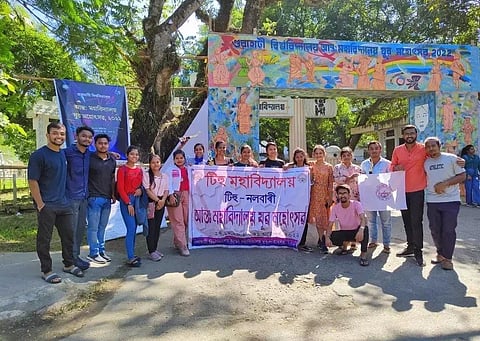
Guwahati - Student politics plays a crucial role within any institution, serving as a vital component of democracy. It extends beyond professional politicians or political entities, affecting every individual within society. Its significance remains steadfast, influencing various aspects of democratic governance.
India's diversity is reflected in its student politics, with unique dynamics observed across different regions. However, while protests in mainland India often create ripple effects, the same level of impact is not consistently observed in the northeast's student political scene.
Talking to The Mooknayak, Rohit, who is pursuing graduation and frequently takes part in politics on campus, expressed that one reason why this discrepancy occurs is because the region is “geographically and culturally isolated.”
He mentions that even student leaders do not practice class and caste politics on campuses, mainly because casteism is more “subtle in the region compared to the rest of the country.”
“Student leaders,” Rohit said, “mainly focus on regionalism.”
They either address regional and indigenous issues or campus-specific causes. Last time, it was the Citizenship Amendment Act.
Jigyas Dutta, another student with an ardent interest in politics, stated that unlike university campuses in North India, those in the region are not connected with each other, so issues generally do not travel.
Dutta said, “We hardly get to know what students at Dibrugarh University are up to.”
He also mentioned that some universities might have a student council for formalities but not a functional student body or union.
According to Dr. Sanjay Mili, Assistant Professor at the Department of Political Science of Bahona College in Jorhat, Assam, students in Assam have actively engaged in advocating for the rights of indigenous groups like the Bodo and Mising communities.
“By aligning with these movements, students have effectively elevated their voices and worked towards instigating broader changes,” he further mentioned in his research paper titled ‘Students Politics in Assam: A Historical and Sociological Perspective.’
The Mooknayak also realized that discussions on the aspects of caste and information on demonstrations that generally happen in the rest of the nation are missing from the students of the region.
This is due to the political landscape in Assam, which mainly encompasses factors like identity politics and regional autonomy.
Protests against the Citizenship Amendment Act were the last issue that connected most student protestors all over the nation. Even then, what was missing in discussions was the fact that the students in Assam were demonstrating for a different reason against CAA.
Critics of the Citizenship (Amendment) Act (CAA) in Assam contend that the recently enacted legislation and its accompanying regulations violate the Assam Accord.
They emphasize that the Assam Accord, signed in the early 1980s following widespread unrest, stipulates a cutoff date of March 25, 1971, for identifying and repatriating foreign nationals.
Opponents argue that providing citizenship to non-Muslim undocumented migrants from Afghanistan, Bangladesh, and Pakistan who entered India before December 31, 2014, contradicts the terms of the Assam Accord.
Anti-CAA groups assert that this legislation could alter the demographic makeup of the region and have adverse effects on Assamese culture and language.
Following India's independence, student politics in Assam underwent significant transformations, increasingly centering on issues related to regional identity and autonomy. The tumultuous decades of the 1960s and 1970s bore witness to a surge in student activism, notably in the ‘preservation of Assamese language and culture.’
Throughout Assam's history, numerous movements and charismatic leaders have shaped the trajectory of student politics. Among these, the Assam Movement of the 1980s, spearheaded by the All-Assam Students’ Union (AASU), holds a prominent position.
This movement was a watershed moment in the state's history, fueled by the overarching goal of safeguarding the rights of indigenous Assamese people against the tide of illegal immigration.
It galvanized widespread support from various sections of society and ultimately led to the historic signing of the Assam Accord in 1985, a significant milestone in addressing the complex issues surrounding immigration and indigenous rights.
Prafulla Kumar Mahanta emerged as a central figure in Assam's student politics, rising to prominence during the Assam Movement.
His leadership not only energized the movement but also paved the way for a successful political career. Serving as the Chief Minister of Assam, Mahanta's tenure reflected the enduring influence of student activism on the state's governance and policymaking.
His contributions during the movement and subsequent political journey have indelibly shaped Assam's political landscape, leaving a profound and lasting impact on the collective consciousness of its people.
You can also join our WhatsApp group to get premium and selected news of The Mooknayak on WhatsApp. Click here to join the WhatsApp group.